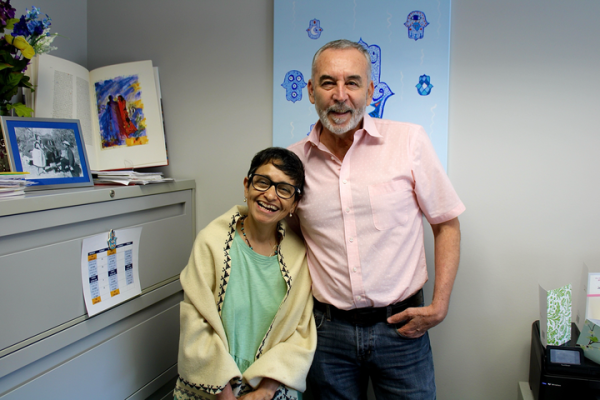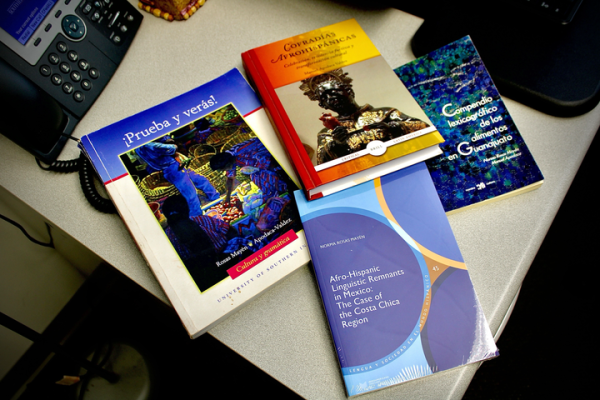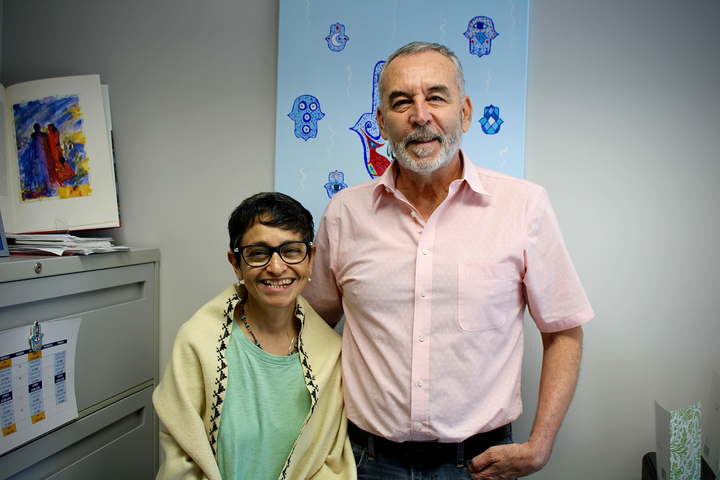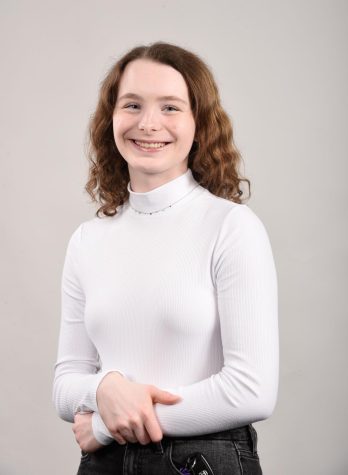Manuel Apodaca Valdez and Norma Rosas Mayén, professors of Spanish, met at a party in Guanajuato, Mexico.
The day she met Apodaca Valdez was unforgettable for Rosas Mayén.
“We met in the city of Guanajuato, Mexico, where we did our Bachelors of Arts,” she said. “It was an artistic party. To attend that party, you had to present something artistic, creative. At that time, Manuel presented a set of poems. I fell in love with the poems.”
Manuel D. Apodaca Valdez and Norma Rosas Mayén’s Backstory
In 1998, they were invited to Purdue University as visiting instructors of Spanish, which is when they moved from Mexico to the United States.
“That was a surprise for us,” Rosas Mayén said. “It was an opportunity for us that we never thought about.”
Before teaching at USI, Apodaca Valdez and Rosas Mayén taught at several other universities, including courses in Mexico, Indiana University and Purdue University.
They also visit their family members in Mexico every six months to at least once a year.
When they were apart for two years due to differing job opportunity locations, Rosas Mayén taught at Saint John’s University in Minnesota, and Apodaca Valdez taught at Wittenberg University in Ohio.
They reunited at USI after two years in different states.
Rosas Mayen arrived at USI in 2008, and her husband, Apodaca Valdez, arrived at USI in 2009.
“That’s why we love USI after two years apart,” Apodaca Valdez said.

Manuel Apodaca Valdez and Norma Rosas Mayén on teaching at USI
“USI has been our family since we arrived,” Rosas Mayén said. “At least for me, it has been my family since I arrived here. I feel at home.”
Rosas Mayén and Apodaca Valdez are not planning to teach elsewhere after their time at USI. Instead, they plan to retire.
“I think it’s not time to look for another chance in another place,” Apodaca Valdez said.
Rosas Mayén’s favorite courses to teach are Spanish linguistic courses and courses on Hispanic cultures.
“They are so different, but at the same time, they share a lot of features,” Rosas Mayén said. “It’s a joy to teach every day. It’s a new experience every day. With my students [there’s] something new that I learn from them every day.”
Apodaca Valdez says he has learned a lot about the differences in teaching in various locations, specifically Mexico versus the United States.
“In my last 20 years, I have been teaching only in the United States, and so that’s why I think I gain more experience, but also expand my horizons on teaching,” Apodaca Valdez said.
Both Rosas Mayén and Apodaca Valdez are members of the Africana Studies minor committee and are faculty affiliated with the Africana Studies program minor. They are also affiliated faculty of the new Latin American Studies program minor that began this fall.
“We helped to make the Africana Studies programs reality because it was a dream for many faculty members in the College of Liberal Arts, and after a lot of meetings, we come out with the program,” Apodaca Valdez said.
Apodaca Valdez and Rosas Mayén on their research:
Rosas Mayén and Apodaca Valdez have completed an immense amount of research, separately and together, over the years of their careers.
“I have been supported by the USI foundation to conduct research in different places around the world lately,” Rosas Mayén said.
Rosas Mayén said her last research trip was in Cuba this past summer. While there, she began researching Afro-Latin American studies but found interest in Judaic studies along the way. Her research became a combination of African, Latin American and Judaic studies with an emphasis on the slave trade and how the Jews participated.
Apodaca Valdez has also conducted research around the world with the help of the USI Foundation. He has traveled to Spain and the Dominican Republic with and without students and completed archival and ethnographic research on communities of African descendants in Peru. He’s also conducted research in Mexico, where his research began as a graduate student and where he completed his Ph. D. dissertation. He has visited Mexico many times since to research Afro-Latin American Studies.
“All my research is about Afro-Latin American studies,” he said. “When we went to the Dominican Republic with students to study abroad, both of us were teaching at the same time. Teachers offer students guidance in general.”
Apodaca Valdez and Rosas Mayén on working together
Apodaca Valdez and Rosas Mayén are a team.
“Whenever I have something new or a question, I ask Norma or ask for her help, and the same she does with me, so we support each other,” Apodaca Valdez said. “She focuses on language, and I focus more on culture, history and literature.”
“As a professor of language, we know that culture is fundamental for learning the second language, so it cannot be separated. If you’re learning the language, you must learn the culture as well,” he said.
To add to her husband’s point, Rosas Mayén said, “You have to contextualize the language.”
“In the area of work, we are colleagues,” Rosas Mayén said. “We support each other critically. The best critique is Manuel for me. When I write a paper, I immediately pass to him to read it, and at times, he’s very picky with some issues that I have, so I should probably rework on that paper. That’s what I love. I don’t want everybody to say, ‘Good job.’ No, I really want the feedback, and I think that both of us provide that. Even if it’s hard at times, it’s good for us.”
They have also published two books together, one of which is used for Spanish courses 307 and 361.

Apodaca Valdez and Rosas Mayén on Hispanic Heritage Month and Dia de los Muertos
Hispanic Heritage Month occurs from Sept. 15 through Oct. 15 in the United States.
This month aims to celebrate the contributions of Hispanic and Latinx heritage communities.
Apodaca Valdez views this month as a chance for action.
“Hispanic Heritage Month is an opportunity to look for actions that aim to empower the Latinx community, not only at USI campus but also outside with the Hispanic or Latino community,” Apodaca Valdez said. “I’m glad that this year there is an organizing of a family day for the Hispanic students who aim to come to USI in the future.”
There are many events on campus relating to Hispanic Heritage Month, including the Spanish Film Club series and Dia de los Muertos.
“We are trying to do a collaboration with different kinds of student organizations to support the Day of the Dead,” Apodaca Valdez said. “For example, we will organize again Dia de los Muertos on Oct. 31.”
Dia de los Muertos is a holiday about gathering family and friends to honor friends and family members who have passed on.
“The Day of the Dead has been an important celebration not only for us as organizers but also for the USI community in general,” Apodaca Valdez said. “Every year, we try to involve these student organizations like the Spanish club, Latinos Unidos, the Panamanian Association, the International Club, and they collaborate with us in a way in which everyone has different responsibilities at the event, and the result is very rewarding because people enjoy attending. It’s a kind of sad moment because we remember those who passed away already, but also, it’s a celebration of feeling that our beloved past persons are in our memories and are still with us, in our memories, in our hearts.”
He said the celebration traces back to ancient times with rituals including food, drink, visits to a cemetery, various flowers, music and dancing.
“I think we don’t try to show off what we do, what we have as a culture, but to share with the community, especially with the USI community, what this event means and why this is important for us and to share the richness of the culture,” Apodaca Valdez said.
Rosas Mayén said her own culture has a fusion of African, indigenous and European roots.
“Dia de los Muertos is a summary of all the collaboration of all these cultures, which is so beautiful for us,” Rosas Mayén said. “It is not sad for me. It’s a time for joy.”
Apodaca Valdez said Dia de los Muertos on campus is “a way to show diversity.”
“One of the goals that USI has is to create awareness about different cultures and that there is not only one ethnic group on campus, but many, and all of them form the community,” he said.
There has been a history of Hispanic Heritage Month events at USI.
“I used to organize the cooking and culture lessons at USI, and that was in October, always, to celebrate the Latinx roots,” Rosas Mayén said.
Personally, Hispanic Heritage Month means “connection to Apodaca Valdez and Rosas Mayén.
“The Hispanic Heritage Month is an opportunity to show what we are doing or to involve other organizations in the community to create more awareness and to empower the Latino community here,” Apodaca Valdez said.
Rosas Mayén said the month is a way “to reaffirm our roots, our own roots, which are theirs,” and a way to be close to their home country.
“It is something that we can never avoid,” Apodaca Valdez said. “Our region, our culture is with us, but it’s not only with us, it’s with so many people, millions of Latin American people who live here, Mexican people or Colombians, Dominicans, Puerto Ricans and so on. As an ethnic group, we face a lot of difficulties, sometimes different challenges, different kinds of thoughts as well. Although it is always a challenge to unite all these people because everyone comes from different backgrounds, we share some aspects in common. On one side, is the language, on the other hand, is the culture and also religion. The origin in particular is very important. It marks you as a person.”
Apodaca Valdez and Rosas Mayén on why learning about Hispanic heritage is important for college students:
Apodaca Valdez said it’s important for students to learn about Hispanic heritage because they need to be aware of cultures other than their own.
“Especially in these times of global issues and globalization, we don’t have to be only confined to one single culture, but to be aware that there exists so many others around you, and even if you don’t want it, sooner or later, you will become in collaboration or contact with all the other cultures that are around you,” Apodaca Valdez said. “One of them is the Hispanic culture.”
Rosas Mayén said it’s important for students to learn about Hispanic heritage so they are not selfish thinkers.
“They live in a world with many cultures, and to know about the others, to recognize the other, is very important,” she said. “I think that the new generations have to think in the other, to not be selfish. We are a plural country from many roots, from many ethnic groups. That is the salt for a culture university, the salt that gives flavor to a particular country. The diversity makes that flavor.”




